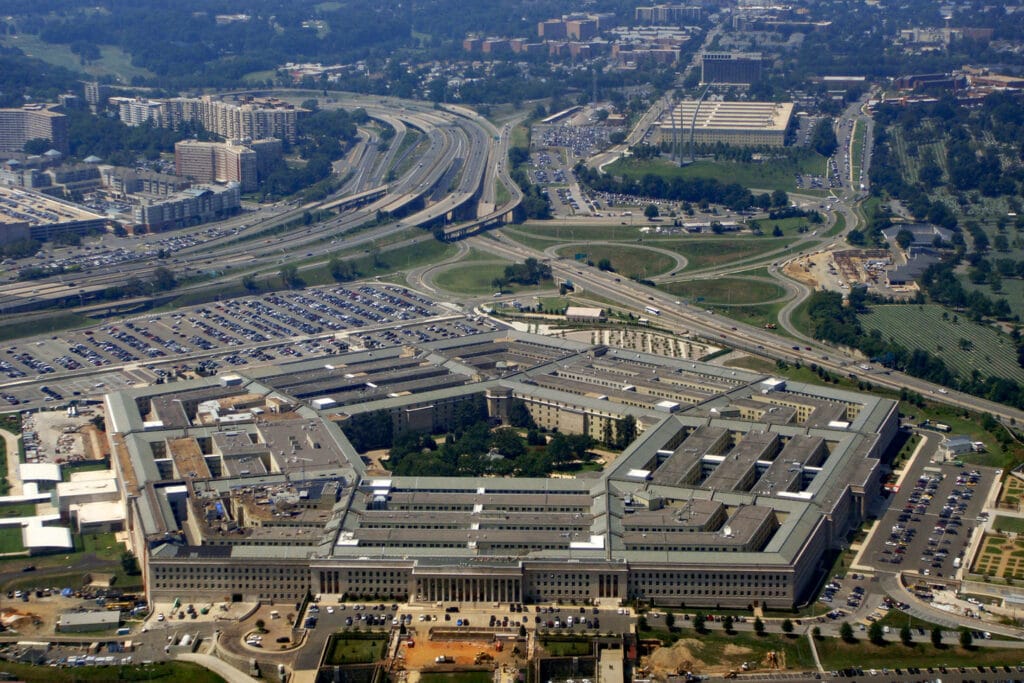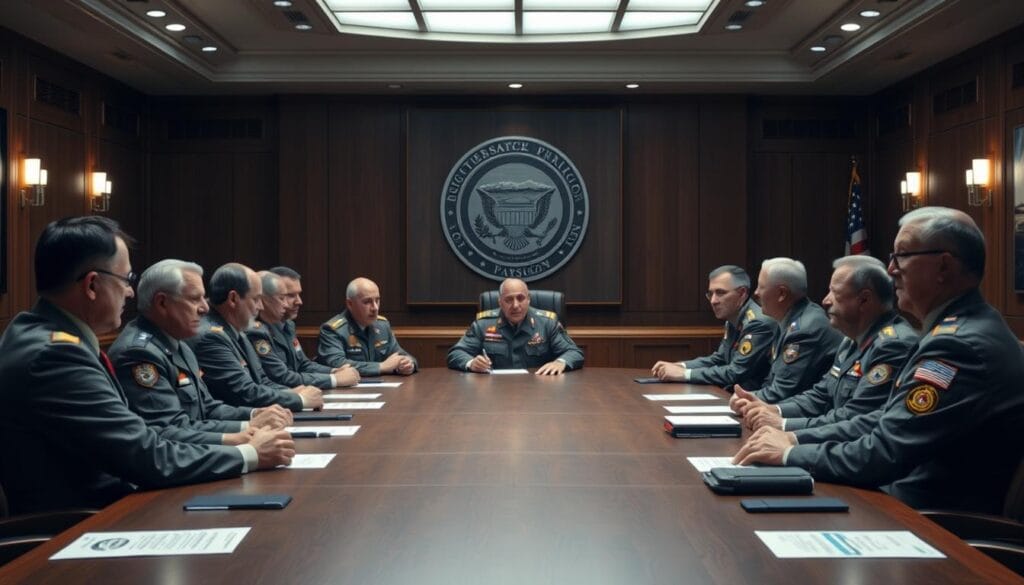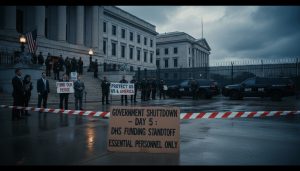How The White House is Testing its Military Authority Extent
Explore the implications as the White House tests the extent of military authority and its impact on U.S. policies and defense strategies.

The Pentagon image credit: mariordo59 from Santo Domingo, Dominican Republic
White House Testing Military Authority Extent: The White House debate examines the scope of executive power in light of the Pentagon’s legal counsel. This is key as swift national security decisions are made. Practical, not abstract, questions on policy, personnel, and process arise.
You can listen to this article’s PodCast Here
With the changing defense policy, the way the DOJ and military authorities work together is being tested. Placing military lawyers in the Justice Department highlights the tension between leadership and independent counsel. This could change how missions are handled both inside the country and abroad.
Money and staffing decisions are crucial now. Discussions on navy yards, planes, and naval strength, as seen in this defense budget analysis, highlight how resources impact readiness and legal issues. Additionally, court debates, such as those regarding presidential power in the context of Supreme Court immunity coverage, highlight the need for clear rules governing policy and law.
Between 2024 and 2025, the mix of executive power, Pentagon advice, and DOJ teamwork will shape the future of U.S. defense policy. The decisions made now will impact training, compliance, and the way operations are run. The outcomes are significant.
White House Testing Military Authority Extent Key Takeaways
- The debate over U.S. military authority centers on the balance between executive power and Pentagon legal oversight.
- JAG Corps roles are in flux as leaders consider deeper DOJ coordination for national security decision-making.
- Resource and staffing decisions in defense policy influence how quickly and lawfully missions are conducted.
- Court debates on presidential power shape expectations for oversight in crisis and routine operations.
- Interagency processes now link legal review, readiness, and deployment in more direct ways.
- Policy shifts in 2024–2025 could redefine the approval process for domestic and overseas missions.
White House Testing Military Authority Extent
The White House is exploring the limits of its power over military advice amid changing threats. High-level lawyers and leaders are witnessing how legal decisions are being made more quickly, with a focus on laws related to national security and collaboration across agencies. This situation is really putting the relationships between civilian and military leaders to the test and how they handle legal risks.
Key developments: Firings of senior JAGs and reshaping Pentagon legal roles
There have been significant changes at the Pentagon, including the firing of top JAGs and alterations to legal roles, aimed at better guiding military decisions and streamlining the review process. There’s a plan to move lawyers from the battlefield to more courtroom duties. This change affects all kinds of military advice, from battle rules to who’s detained, causing big waves throughout the military.
Additionally, the changing budgets and missions put more strain on the system. For instance, security needs at borders and seas are prompting them to rethink who handles legal matters and how closely they monitor actions; this issue is well described in an analysis of the Pentagon’s legal shake-ups and funding decisions here.
Presidential authority vs. military legal oversight in national security decisions
Presidential powers enable swift decisions in crises, but military lawyers ensure that these decisions adhere to the law and established policies. However, with less time, it becomes increasingly complex to thoroughly review every action. Efforts to make decision-making smoother could lead to fewer specialized lawyers in key positions.
The debate around U.S. support for allies highlights these challenges. The White House has to consider risks and legalities before acting, especially when using American weapons abroad. This dynamic tension is further explored in a report on how laws and presidential decisions intersect here.
Implications for the US government, military testing, and testing military power
Changes in how agencies staff and make decisions are happening, alongside new strategies for delicate missions. Moving legal experts could slow down legal advice and affect decisions in crisis times. The health of civil-military dialogue depends on keeping open channels for honest advice, even as policies and roles evolve.
As the government updates its strategies for borders, seas, and rival powers, every military move is evaluated for its legality and logic. Public discussions on intelligence and the use of force are guiding standards for the responsible use of power. These ongoing talks influence how power is checked and balanced, as outlined in this analysis of legal teamwork and leadership here.
Inside the Pentagon: JAG Corps Shake-up and Legal Pushback
The JAG Corps is undergoing significant changes, sparking debate over the Pentagon’s legal independence. Leaders and everyday lawyers observe a shift in how legal advice is provided, which impacts promotions and job opportunities. This has caused some tension between military and civilian lawyers inside the Pentagon.
Firing of Lt. Gen. Joe Berger and Lt. Gen. Charles Plummer amid policy disputes
Lt. Gen. Joe Berger and Lt. Gen. Charles Plummer were relieved of their duties after arguing about the use of force and support within the country. Their firing shows a shift in who is listened to during discussions on targeting and detention. A report on a Caribbean operation highlights how policy changes can conflict with legal advice, raising concerns over decisions that could escalate conflict. Read more about this tension here.
Alleged political litmus tests for replacements and concerns over independence
Officers say there are informal checks that serve as political tests for new hires. This worries them about the Pentagon’s ability to make independent legal decisions. If new choices are more about following orders than being honest, the result is fewer challenges and risks being noted. This problem worsens when the military is preoccupied with operations.
Demoting top JAG posts from three-star to two-star and its operational impact
Lowering the rank of top JAG positions would reduce their influence and direct contact with leaders. This means that urgent legal issues may not be raised as quickly. During fast-paced crises, this could weaken the legal team’s ability to speak up when it’s most needed.
Plan to detail up to 600 JAGs to the DOJ as immigration judges
Moving up to 600 military lawyers to work as immigration judges could potentially detract from the expertise required for military operations. This move might lead to less legal support for deployments, investigations, and training. It would change how manpower is used and increase tension between military and civilian legal needs.
| Change | Intended Rationale | Immediate Effect | Operational Risk |
|---|---|---|---|
| Removal of Lt. Gen. Joe Berger and Lt. Gen. Charles Plummer | Realign legal advice with current policy goals | Leadership vacuum and rapid turnover | Loss of continuity on targeting and detention reviews |
| Alleged political litmus tests | Ensure appointees reflect executive priorities | Narrowed diversity of legal viewpoints | Reduced the challenge to flawed assumptions |
| Rank downgrades for top JAG billets | Flatten hierarchy and streamline decisions | Lower access to senior principals | Delayed elevation of legal objections in crises |
| DOJ immigration judge detailing (up to 600 JAGs) | Boost adjudication capacity in immigration courts | Legal talent diversion from operational units | Gaps in deployment advice, training, and investigations |
Contested Uses of Force and Domestic Missions
Washington is now actively debating the legal use of force. Leaders discuss domestic military support and its alignment with international humanitarian law. These discussions impact public trust, military readiness, and the National Guard’s domestic operations.
Caribbean strikes: DOJ opinion on armed conflict with cartels vs. legal experts’ doubts
The Department of Justice supports treating cartels as armed conflicts in the Caribbean. Some scholars disagree, saying cartels don’t meet the criteria for international humanitarian law. These legal views affect how targets are chosen and how detainees are treated.
Analysts compare this to counterterrorism efforts but note differences. Stretching the ‘cartel conflict’ label could lead to pushback from partners and the court. It raises questions about engagement rules and reporting.
Excluding key international law voices and internal dissent risks
Experts warn against ignoring international law advisors. Silencing dissent can cause oversight and legal challenges. Agencies are advised to keep clear records and allow feedback.
Ignoring warnings from experts, as seen in debates over climate science, is a risky move. Legal opinions on the use of force need careful consideration. Balance is key to passing legal and international scrutiny.
Texas National Guard and immigration enforcement: training and legality questions
Questions arise about the legality of the National Guard’s role in immigration. Their duties differ when under state or federal command. Authorities must ensure missions are legal and properly defined.
The community’s welfare is also a concern. Cooperation with local law enforcement matters. It’s important to maintain accountability and assess the impact on soldiers’ key skills.
Base politics: Requests for troop participation in political events and legal limits
Military bases are getting more requests related to politics. Commanders must adhere to rules to prevent the partisan use of military resources. They help troops understand what’s allowed during elections.
Leaders must ensure messages don’t suggest endorsements. They also set rules for off-duty behavior and online activity. They balance security, image, and legal concerns, aware that minor errors can spark big debates.
| Issue | Key Rule or Standard | Operational Impact | Risk Signal |
|---|---|---|---|
| Cartel armed conflict classification | International humanitarian law thresholds on organization and intensity | Targeting, detention, and partner coordination | Legal experts’ doubts and potential court scrutiny |
| Use of force legal opinions | Interagency review and facts-on-the-ground verification | Rules of engagement and escalation control | Credibility of the record and allied support |
| National Guard roles at the border | Posse Comitatus and state vs. federal status authorities | Training alignment and mission scope | Immigration enforcement legality challenges |
| Political activity restrictions | DoD directives on partisan events and use of installations | Event approvals and uniform participation | Perception of endorsement during elections |
| Domestic military support | Defense Support of Civil Authorities procedures | Request validation and cost tracking | Mission creep and resource strain |
Security in election years also affects plans for civil support and information accuracy. Teams adjust their stance, aligning with laws and public expectations. Read more about these security concerns in the threat brief.
White House Testing Military Authority Extent Conclusion
The debate over military authority is now a very real concern. We’re seeing significant changes, including the firing of top lawyers and shifts in rank. There are plans to send many lawyers to other places. This raises challenging questions about the balance between the military and the government. It also raises concerns about who oversees the law in defense matters. The core issues here are the limits on the president’s power and the independence of military lawyers. These are crucial for how we manage national security and follow the law in military operations.
Arguments about strikes in other countries and missions at home show the importance of having independent lawyers. When politics influences legal advice, it can confuse and undermine commanders. Working better together, having open reviews, and clear leaders in this process help keep our military disciplined and responsible. A plan focused on being ready, along with checks between different agencies, is outlined in defense plans like this national security governance perspective. This indicates that our defense strategy, funding, and laws must be aligned.
Large organizations remain safe when leaders select the right people, document their decisions, and adhere to laws at every level. These truths underscore the necessity for military lawyers to be independent and for the president’s power to be constrained. In today’s world—with border issues, violence from drug cartels, and competition from other big countries—the rule of law must guide military actions. It’s about how jobs are assigned, how advice is considered, and how we handle dangers.
As we approach critical global events, our policies must strike a balance between the military and the government, ensuring that the law is followed in defense matters. We need clear rules for appointing officials, better checks on ethics, and public summaries of advice when possible. By coordinating effectively between the Department of Justice and the military, and by adhering to our principles, leaders can keep us safe without overstepping the boundaries set by the Constitution.
White House Testing Military Authority Extent FAQ
What does “White House testing military authority extent” mean in this context?
It means the White House is attempting to exert more control over national security law. This also affects legal matters within the Department of Defense, also known as the Pentagon. Proposed changes are being made to the Judge Advocate General (JAG) Corps. This includes debates on when and how to use military power.
What are the key developments inside the Pentagon’s legal ranks?
Senior JAG leaders were fired or demoted, pointing to a reshaping of military legal roles. This includes downgrading JAG positions and moving hundreds of JAGs to the Department of Justice. It could impact military readiness and law enforcement operations.
How does presidential authority interact with military legal oversight?
The president leads military operations with advice from JAGs on laws and limits. Conflict arises when the president’s goals conflict with JAG’s legal advice. Laws such as the War Powers Resolution and domestic limits influence their advice.
Why would downgrading JAG billets matter for national security decisions?
Rank affects influence. Lower rank for top JAGs could slow down important legal advice. It may change how quickly rules of engagement are reviewed, affecting coordination and risk management.
What is the plan to detail JAGs to the Department of Justice, and what are the implications?
Moving up to 600 military lawyers to work as immigration judges at the DOJ could impact military missions. It could lead to less legal support for military actions and affect readiness for emergencies.
How do the reported firings of Lt. Gen. Joe Berger and Lt. Gen. Charles Plummer fit into this picture?
Their removals signal clashes over legal limits for military use and missions. Some see this as a challenge to the balance between presidential power and the army’s legal advice. This could have effects across the JAG Corps.
Are there concerns about political litmus tests for JAG replacements?
Yes. There are concerns that new JAG candidates may be screened for their political views. This could harm the independence needed for lawful operations. Critics argue it’s crucial for keeping trust with courts and allies.
How does this debate affect interagency processes and national defense strategy?
Changes in legal ranks could impact how quickly legal issues are brought to the attention of leaders. This could change defense actions, policy on detainees, and other operations. It’s about how effectively different agencies collaborate on security.
What is the controversy over classifying Caribbean strikes against cartels as armed conflict?
There’s a debate over whether operations against cartels are considered armed conflict. Experts disagree on this, raising concerns about the application of international laws. They argue that not all criteria are met, stoking debates on legality.
Why does excluding experienced international law advisors raise risk?
Leaving out expert views might lead to mistakes and legal challenges. An independent review before taking action helps avoid errors and ensures operations are conducted legally. This is crucial for sound decision-making.
How do Texas National Guard deployments factor into legal oversight?
Deployments for border enforcement raise legal questions. This involves training, command under laws and rules, and performing military tasks in civilian settings. Clear legal advice is vital to prevent overstepping bounds.
What are the legal limits on troop participation in political events?
The military has rules prohibiting its members from engaging in politics. Careful checks are necessary to maintain neutrality and prevent the misuse of military resources at political events.
How do compliance frameworks in large organizations relate to the Pentagon’s legal processes?
The military, like healthcare, needs proper certifications and legal reviews. This ensures they follow all laws and adhere to best practices for risk and governance, similar to those in other sectors.
What is the broader policy context in 2024–2025, including climate debates?
Diverse expert opinions are key as we approach global climate talks. A study warns against simplifying complex issues. This caution also applies to security law, where the selective reading of laws can lead to misinterpretation.
How might detailing JAGs to the DOJ affect operational readiness and training?
Moving legal advisors could weaken support for military activities. It may also affect training and slow down legal investigations. This impacts preparedness for various operations.
What safeguards help preserve independent military legal advice?
Maintaining high JAG ranks, direct access to leaders, adherence to legal timelines, and fair appointments are vital. They ensure military operations follow the law and stay expert-driven.
How does this affect the balance of power between the branches of government?
Increasing presidential control over military legal advice can shift power. Maintaining balance requires Congress and the courts to monitor and receive input from all relevant agencies.
What are the potential consequences if legal objections are suppressed or delayed?
Risks include illegal orders and damage to alliances and reputation. Early legal review minimizes these risks and ensures actions comply with US laws and treaties.
Which keywords are central to understanding this issue?
Essential terms include the JAG Corps, Pentagon, DOJ, rules of engagement, and laws such as the Posse Comitatus Act. They help grasp the issues around military operations and legal advice.








